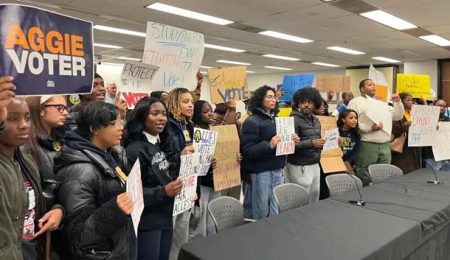One Law, Many Consequences

Photo: Urban News
By Nelda Holder –
The North Carolina General Assembly adjourned in the wee hours of the morning on September 30, after eight months of producing legislation and a state budget that was three months late.
The actions taken will, of course, produce varying results, but House Bill 318, known as the Protect North Carolina Workers Act, was a late-blooming act that deserves further discussion.
The bill, signed into law by Gov. Pat McCrory on October 28, 2015, will affect various places new restrictions regarding legal identification for immigrants, and new requirements regarding e-verification for workers.
Opposition was spearheaded by nonprofits working with or advocating for the state’s immigrant community, such as the NC Justice Center’s Immigrant and Refugee Rights Project, and the NC-NAACP; joined by faith-based organizations, labor representatives, civil liberties advocates, and at least one town council.
Ironically, the campaign for a gubernatorial veto came to an end when McCrory signed the bill in Greensboro, one of the cities directly affected by the legislation and one of the first cities in the state to accept identification cards produced by the FaithAction nonprofit, a statewide organization based there. The IDs allowed undocumented residents to access certain city services such as signing up for utilities or library cards, or registering for parks and recreation programs, according to the city’s website.
The Greensboro Police Department has partnered with FaithAction since 2012. City Police Chief Wayne Scott, quoted by Time-Warner News in Greensboro, applauded the three-year-old program for helping officers keep the public safe, noting that the 3,000 people carrying them – had they been encountered through police involvement such as investigating a motor vehicle crash – would otherwise have had “absolutely no ID.” It is anticipated, according to the city’s web post, that law enforcement will be allowed to use the FaithAction ID to identify a resident when no other form of identification is available.
The city council had opposed HB 318 by a vote of 8-1; Greensboro’s Human Relations Commission opposed it unanimously; the Greensboro News and Record and the police department spoke out against it before McCrory signed it into law.
Follow the Winding Road
The bill, like others passed in the waning hours of the Legislature, followed a winding path to its final destination. It was filed March 19 under the short title of Protect North Carolina Workers Act, with the express purpose of increasing the number of employers required to participate in the federal E-Verify program, exempting temporary employees, farm workers, and domestic workers. A second purpose was to exclude certain consulate or embassy documents from use as identification for governmental and law enforcement purposes.
By September 29, when it finally passed, it had been amended to address four things:
1) Deletion from current state “identification” law of the matricula consular document issued by the Mexican Consulate for North Carolina, or any similar document from the consulate or embassy of another country;
2) E-Verify compliance in certain governmental contracts;
3) Prohibition of the adoption of sanctuary city ordinances in the state;
4) Prohibition of certain federal waivers applying to low-employment areas of the state that could otherwise continue federal food and nutrition benefits for able-bodied adults without dependents.
Each provision, according to Rev. David Fraccaro, executive director of FaithAction International House in Greensboro, has the “potential to be pretty damaging towards immigrants and low-income people (who) may have access to food stamps.” Judges, clerks, magistrates, and government officers can no long accept his organization’s FaithAction ID, for example, which affects people who need such things as birth certificates for a child, marriage licenses, or documents needed by domestic violence victims.
He is opting to remain positive, however, by hoping the distinction of “government official” will not apply to health officials, schools, law enforcement, and cultural institutions so that the ID will still serve community residents in those ways.
A Nascent Movement
Fraccaro says other cities have been in touch with his organization since the law’s passage, and a meeting with eight different cities plus representatives from Cincinnati, Ohio, attended a meeting about the FaithActionID program the day after HB 318 was passed. And even though the ID’s power has been diminished, he asserts there continues to be value in bringing immigrants and the faith community together for conversation around the program.
Fraccaro did not list any Western North Carolina cities as potential partners in the ID program. But in 2013, the city of Asheville passed a civil liberties resolution (not a “sanctuary city” ordinance) that includes statements of support for the constitutional rights and civil liberties of “any and all persons,” and protection against discrimination based on race, gender, disability, immigration status, and other factors.
A query concerning the city’s current e-verification practices and whether the new law will create any change received no response.
As for the prohibition of certain federal waivers, the state’s AFL-CIO issued a statement saying the law would “force more residents struggling to find and keep a job into deeper hunger and poverty by denying (that) access.”
Clearly, HB 318 and its provisions will be watched closely. Its effects on vital services and basic needs are being monitored by the North Carolina Justice Center, which has instituted a hotline to report problems: 919-526-0676.
Read Nelda Holder’s blog, www.politicallypurplenc.com







